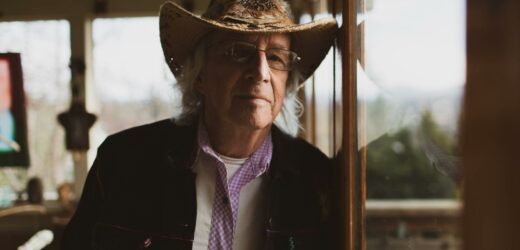Patrick Haggerty was aware of the risks of releasing a radical, gay-themed country album in 1973. His Lavender Country project, with no-punches-pulled songs like “Cryin’ These Cocksucking Tears” and “Back in the Closet Again,” was almost certain to spell the end of his musical career, but he felt compelled to do it anyway.
Haggerty, who’d grown up on a farm near Port Angeles, Washington, had a supportive father who disdained capitalist greed (“[He] was the complete shit when it came to handling a queer kid,” he says). After getting booted from the Peace Corps for being gay, Haggerty got deeper into the anti-war movement and socialism. He’d been haunted by the extreme poverty he’d seen in India, then surprised by the functionality of Cuba, even if he didn’t agree with every aspect of its revolution. He’d seen the possibilities of what socialism offered, and that impulse informed his decisions, including the one to make Lavender Country.
Related Stories
Orville Peck Summons Springsteen Grandeur and Sad Country-Rock on New Album 'Bronco'
Trixie Mattel Is Haunted by Bittersweet Memories in 'This Town'
Related Stories

'Friends': The Top 10 Ross Moments
50 Greatest Movie Superheroes
“I knew that I would probably wear a scarlet letter on my back for the rest of my life and that it [would] doom me to obscurity,” the 77-year-old Haggerty says on a call from his home in Washington state. “I was right for 35, 40 years, because that’s exactly and precisely what happened. I didn’t shed very many tears about it. I had a life to live. I considered myself a gay Marxist activist, and that was my true passion and my true calling.”
After Lavender Country, Haggerty mostly devoted himself to a life outside music. He focused on his political activism and even ran for office; he was a social worker; and he raised two kids, as well as married his husband. Other than a brief reunion around 2000, he had largely left Lavender Country in the past and moved on. But with record label Paradise of Bachelors’ 2014 reissue of the album, Haggerty was elevated from obscurity to cult-hero status, a grand patriarch of queer country music from a time before there was a term to describe what he was doing.
“My life took a sharp turn and it’s been taking a sharp turn ever since,” Haggerty says.
Fifty years later, Haggerty has released a second album under the Lavender Country name. Titled Blackberry Rose, the project features 10 new recordings of songs Haggerty composed over the decades and put together with supporting musicians including Robert Hammerstrom, who had played on the original Lavender Country album, and Bobby Inocente. Though he’d mostly walked away from making music, except for a handful of years where he and a friend had regular gigs singing in retirement homes, Haggerty was still composing.
“I had a collection of bits and pieces of songs that I had been writing,” he says. “All those many years, that was the one thing that I did, was continue to write songs. So the Blackberry Rose album is really a historical photograph of my songwriting over the last 50 years.”
The oldest song, “Gay Bar Blues,” is a 12-bar style tune that Haggerty calls a “pre-Stonewall photograph” from the 1960s. It still accurately captures the strange combination of emotions that can suffuse queer spaces after a lifetime of experiencing homophobia. “It’s interesting how the fear and alienation and stumbling over yourself and knowing that you’re not pretty enough to pick that guy up and all that stuff is so resonant,” he says. “And what it really means is that even now in our minds, we’re still trapped.”
Haggerty also offers a witty ode to feminist activist Clara Fraser, with whom he once did some organizing work, and riffs on a Tammy Wynette classic with the tongue-in-cheek “Stand on Your Man.” The haunting title track is a ballad that examines illicit interracial relationships and white violence. “Blackberry Rose” also serves as a posthumous tribute to Haggerty’s friend, the San Francisco activist and musician Blackberri, who died in December.
There’s a charmingly unvarnished approach to these new recordings, a mix of classic honky-tonk sounds with the lo-fi aesthetic of K Records or even the country-leaning work of the Magnetic Fields. “I Can’t Shake the Stranger Out of You,” for example, shimmers and jangles like a lost indie-rock classic, both funny and poignant as it describes a frustrating breakdown of intimacy. Haggerty recorded a previous version of it on the 1973 album, and drag star Trixie Mattel released her version in 2020.
Mattel is one of many artists influenced by Haggerty’s work, along with Orville Peck and Mya Byrne, who has played bass for Haggerty in addition to her solo career. Singer-songwriter Paisley Fields, who got to know Haggerty when they toured together in 2019, says hearing Lavender Country helped fashion his own queer spin on country music.
“The songs were brutally honest and had a fearlessness to them,” Fields says. “It was empowering to hear Patrick singing so unabashedly about being queer in country songs.”
That unabashed honesty has proven to be a calling card for Haggerty, who knew that the original Lavender Country album and his outspoken support of socialism would prove too hot to touch for most people, particularly in more conservative country-music circles.
“I knew that it was going to deny me any opportunity to pursue a career in country music, which was hard to swallow because I wanted to do that,” Haggerty says. “And interestingly, it turned out I was wrong.” In a roundabout way, Haggerty is now getting to make country music in an environment that’s become considerably more welcoming to its queer artists, with a supportive independent community as well as out performers like Brooke Eden and TJ Osborne on major country labels.
Not that it would have changed Haggerty’s approach or softened him in any way. With or without music, he has still been able devote his time to the things that mattered most to him: his two children, his husband, and his activist work.
“I’m like every other parent, certainly every other devoted parent — my children are my life. They’re my everything,” he says. “I spent my life with my husband and I spent my life with my children. My life with the three of them is so much deeper and more important and more significant and more dear to me than any of this Lavender Country stuff.”
Source: Read Full Article


